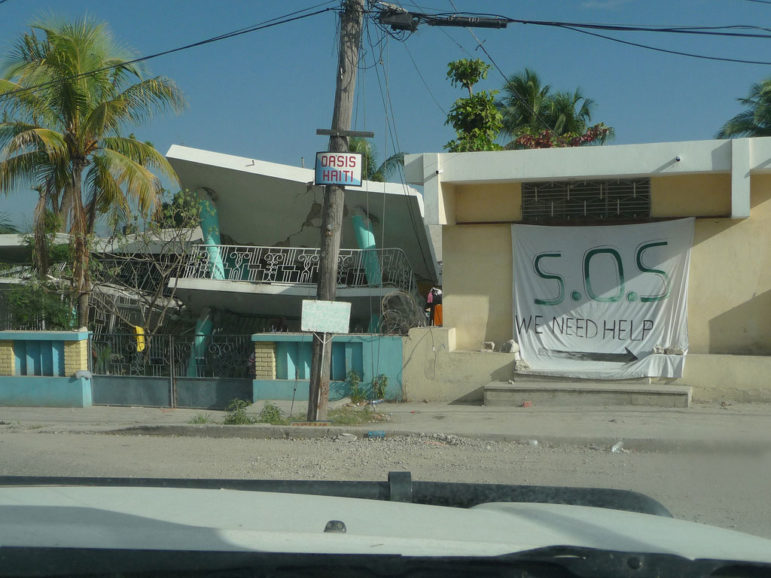
October 16, 2016; Washington Post
The Washington Post’s Editorial Board forthrightly writes to remind its readers that Haiti’s suffering is growing by orders of magnitude in the aftermath of Hurricane Matthew. There’s little doubt that time is not on the side of the estimated 1.4 million Haitians, more than a tenth of the country’s population, in need of immediate assistance. The threats to life are mounting: shortages of food, fresh water, shelter, and medical supplies; washed-out roads, bridges, canals, and sewer systems; a caretaker government; looting; and the potential for “a spike in Haiti’s already deadly epidemic of cholera.” The Editorial Board encourages its readers to be generous to the NGOs responding to the crisis. And so we should be.
According to the World Food Program, nearly 100 percent of crops and 50 percent of livestock were destroyed in the Grand-Anse region. “A ‘flash appeal’ for Haiti issued by the U.N. humanitarian agency in Geneva was not getting anywhere near the level of support officials are seeking, with only about 5 percent pledged so far of the $120 million requested.”
The New York Times reports in this pictorial that for many Haitians, caves offer the only shelter.
Mary Anastasia O’Grady, a Wall Street Journal editor, makes the case in “The Curse of Charity in Haiti” that supporting the responding NGOs makes humanitarian sense, but our philanthropy may have unintended consequences. O’Grady references the award-winning 2015 documentary “Poverty, Inc.,” which discredits the “aid brigades” as producing the wrong outcomes.
Haitians joke that they live in the land of 10,000 nongovernmental organizations (NGOs.) The country has also been the recipient of billions of dollars in foreign-government bilateral and multilateral aid over the last quarter century. This enormous giving has created harmful distortions in the local economy because when what would otherwise be traded or produced by Haitians is given away, it drives entrepreneurs out of business.
Are all those smart and efficient NGOs and their benefactors mistaken? Might they have been wrong since the founding of the World Bank, the United Nations, and ever since President Harry S. Truman announced the first U.S. foreign aid program in 1949? In 2014, William Easterly, Professor of Economics at New York University and co-director of the NYU Development Research Institute, wrote a book entitled The Tyranny of Experts. In her lengthy and well-worth-reading review of the book for the Washington Post, Marie Arana writes:
Sign up for our free newsletters
Subscribe to NPQ's newsletters to have our top stories delivered directly to your inbox.
By signing up, you agree to our privacy policy and terms of use, and to receive messages from NPQ and our partners.
If Easterly has it right, the development business is hobbled not only by a tacit racism in which whole regions of Africa, Latin America and Asia are deemed “helpless,” but by a willful neglect of history. The past, geography, ethnic identities, societal nuances—none of these play a part in the present-day development calculus, he tells us. The “Blank Slate” mentality—the conviction that aid needs no analysis beyond comparative statistics and growth rates—is often the rule in development circles.
One largely missed email included in the release of 35,000 of Hillary Clinton’s emails by the U.S. State Department in response to a Freedom of Information Act Lawsuit, was addressed to “Dad, Mom.” [The e-mail in full may be read here.] It provided a blunt assessment of the NGO response to the 2010 earthquake and serves as a fitting conclusion to this Newswire that seeks to honor the dignity and capacity of the Haitian people.
“The incompetence is mind numbing,” she told her parents. “The UN people I encountered were frequently out of touch…anachronistic in their thinking at best and arrogant and incompetent at worst.”
“There is NO accountability in the UN system or international humanitarian system.” The weak Haitian government, which had lost buildings and staff in the disaster, had something of a plan, she noted. Yet because it had failed to articulate its wishes quickly enough, foreigners rushed forward with a “proliferation of ad hoc efforts by the UN and INGOs [international nongovernmental organizations] to ‘help,’ some of which have helped … some of which have hurt … and some which have not happened at all.”
The former first daughter recognized something that scores of other foreigners had missed: that Haitians were not just sitting around waiting for others to do the work. “Haitians in the settlements are very much organizing themselves…Fairly nuanced settlement governance structures have already developed,” she wrote, giving the example of camp home to 40,000 displaced quake survivors who had established a governing committee and a series of sub-committees overseeing security, sanitation, women’s needs and other issues.
“They wanted to help themselves, and they wanted reliability and accountability from their partners,” Chelsea Clinton wrote. But that help was not coming. The aid groups had ignored requests for T-shirts, flashlights and pay for the security committee, and the U.S. military had apparently passed on the committee’s back-up plan that they provide security themselves. “The settlements’ governing bodies—as they shared with me—are beginning to experience UN/INGO fatigue given how often they articulate their needs, willingness to work—and how little is coming their way.”
The world’s NGOs would do well to heed these words in trying to avoid repeating history and perpetuating the misery that seems to cling to Haiti.—James Schaffer












